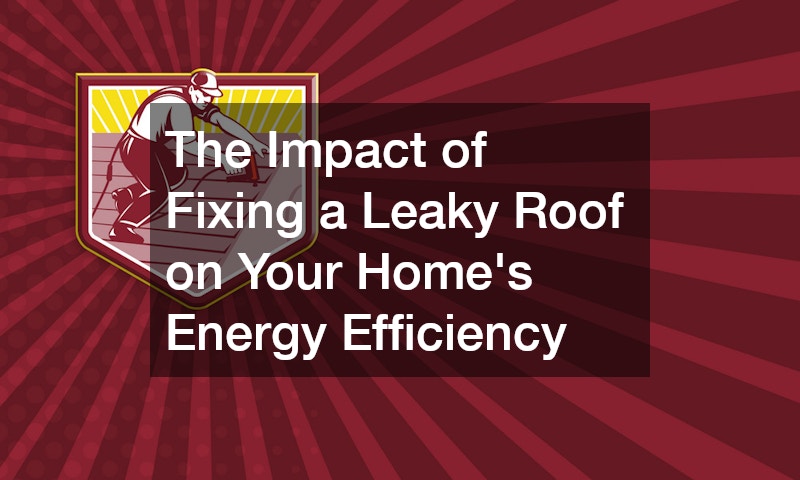
The quest for energy efficiency is increasingly becoming a central theme in home renovations. Homeowners are not only seeking to cut down their utility bills but also contribute positively to the environment. As a result, there are numerous energy efficiency examples available to guide individuals in making more informed decisions about home improvement projects.
This article will explore the various ways you can enhance your home’s energy efficiency through strategic renovations. By examining the roles of attic insulation, window replacement, and other energy-saving measures, we aim to provide a comprehensive guide on improving energy efficiency. Our focus will remain on practical, achievable solutions managed by seasoned professionals like insulation contractors and residential roofers.
Energy efficiency examples are not just limited to reducing energy consumption. They also include improving the comfort and lifespan of your home. With an emphasis on sustainability, this article breaks down individual renovation components that can lead to significant energy savings.
How Attic Insulation Can Improve Your Home’s Energy Efficiency

Proper attic insulation is a cornerstone of home energy efficiency. Attics are common sources of energy loss since heat rises and can escape through the roof. By installing high-quality insulation, you effectively keep warmth inside during winter and prevent excessive heat from entering during summer.
Numerous energy efficiency examples highlight attic insulation as a quick win for homeowners seeking to reduce energy bills. Insulating your attic can reduce heating and cooling costs by up to 20%. Work with professional insulation contractors to ensure that your attic is adequately insulated and that all gaps and cracks are sealed.
Don’t overlook the types of insulation available, as each serves different purposes. Fiberglass, cellulose, and spray foam are popular choices. Your choice will depend on your home’s unique needs, budget, and environmental conditions.
Working with Insulation Contractors to Maximize Energy Efficiency in Your Renovation
Insulation contractors play a crucial role in enhancing your home’s energy efficiency. These professionals possess the expertise required to choose the right materials and install them effectively. By collaborating with experienced insulation contractors, you can be assured of quality workmanship and optimal energy-saving results.
A professional consultation with insulation contractors will often involve a comprehensive energy audit of your home. They identify areas that require insulation improvement, providing energy efficiency examples specific to your renovation needs. This way, you can prioritize which aspects of your home need immediate attention.
Furthermore, hiring professionals ensures that your insulation adheres to energy codes and regulations, which is crucial for compliance and potential resale value. Remember that insulation is not merely about stuffing material into cavities; it requires a strategic approach for maximum effectiveness.
The Impact of Fixing a Leaky Roof on Your Home’s Energy Efficiency

A leaky roof is a major predator of energy efficiency in any home. Not only does it allow water infiltration, but it also permits conditioned air to escape, leading to higher energy bills. Repairs to fix a leaky roof can dramatically enhance energy efficiency by ensuring that your home’s thermal envelope is intact.
Energy efficiency examples often list roof repairs as essential for achieving a completely sealed home. Repairing a leaky roof prevents heat gain in summer and minimizes heat loss in winter, effectively reducing your HVAC system’s load. The cumulative effect is a substantial reduction in energy consumption and cost savings.
Consulting with roofing services will provide insight into potential issues and recommended solutions. Skilled professionals can offer guidance on the types of materials and techniques available for effectively sealing your roof, promoting superior energy efficiency.
Roofing Services That Boost Energy Efficiency: What to Consider During Renovation

When planning a home renovation with energy efficiency in mind, roofing services are integral to the discussion. With several roofing materials available, it’s essential to consider options that provide high reflective capabilities and insulation properties. These measures can significantly conserve energy by maintaining the home’s internal climate.
Energy efficiency examples often highlight cool roofs, which reflect more sunlight and absorb less heat compared to traditional roofing materials. Roofing services can assist in selecting the right type of cool roof based on your climate zone and aesthetic preferences. This decision not only improves energy efficiency but also extends the roof’s lifespan.
In addition to materials, consider installing roof vents to improve air circulation and eliminate excess humidity and heat. Proper ventilation is a crucial component in reducing energy dependence while maintaining a comfortable indoor environment. Residential roofers offer invaluable insights into maximizing your roof’s contribution to energy efficiency.
Why a Residential Roofer Should Be Part of Your Energy-Efficient Home Renovation

A residential roofer is an indispensable ally in any energy-efficient home renovation project. Their deep understanding of materials and techniques ensures that the roofing component of your home is optimized for energy savings. By involving them early in your project, you can address potential problems before they escalate.
When it comes to energy efficiency examples in roofing, proper installation and material choice are paramount. Residential roofers can recommend and implement solutions such as cool roofs, solar panels, and reflective coatings to enhance efficiency. These strategies translate into tangible reductions in energy use and utility expenses.
Moreover, their ongoing maintenance services ensure that your roof continues to perform efficiently over its lifespan. Regular inspections, repairs, and updates prolong the durability of your roofing system, solidifying the benefits of your energy-efficient renovation.
Updating House Siding for Better Insulation and Energy Efficiency
House siding is another critical component that affects your home’s energy efficiency. Updating or upgrading your siding can provide a robust insulation barrier against external weather conditions. It acts as a protective layer, reducing the influence of temperature fluctuations on your indoor climate.
Energy efficiency examples often underscore the importance of high-quality siding materials. Vinyl, fiber cement, and engineered wood are popular choices known for their durability and insulating properties. These materials help maintain a consistent temperature within your home, lessening the load on your HVAC system.
When planning a siding renovation project, collaborate with specialists to select the best options for your home’s architecture and energy goals. They can provide insights into designs and technologies that maximize energy efficiency without compromising aesthetics.
The Role of Window Replacement in Enhancing Your Home’s Energy Efficiency
Window replacement is one of the most effective ways to achieve immediate improvements in energy efficiency. Old, single-pane windows lead to significant heat gain and loss, putting a strain on your heating and cooling systems. Upgrading to energy-efficient windows helps break this cycle of inefficiency.
Energy efficiency examples frequently highlight the benefits of double or triple-pane windows with low-emissivity coatings. These advanced features reduce heat transfer, glare, and UV exposure, contributing to a more stable indoor climate. Window replacement is a strategic renovation that enhances both comfort and reduces energy expenses.
Professionals specializing in window replacement can help you choose products that suit your home’s style and energy efficiency needs. Their expertise ensures correct installation, which is vital for optimal performance and longevity of your investment.
How Garage Door Services Can Contribute to a More Energy-Efficient Home
Garage doors might not be the first thing that comes to mind when considering energy efficiency, yet they play a pivotal role. A poorly insulated garage door is a significant source of energy loss, leading to higher heating and cooling costs for adjacent spaces. Garage door services focused on energy efficiency can help rectify this oversight.
Energy efficiency examples demonstrate how insulated garage doors help maintain the desired temperature within your garage, minimizing energy waste. Choosing a garage door with a high R-value can vastly improve this insulation barrier. Professional garage door services ensure that whether through installation or retrofitting, the door meets the desired efficiency levels.
Add-ons such as weather-stripping and door sweeps further enhance garage door insulation. By reducing drafts and sealing gaps, these modifications contribute to maintaining a thermally efficient garage environment and a more energy-efficient home overall.
Choosing the Right Garage Doors to Improve Energy Efficiency in Your Home
When selecting garage doors with energy efficiency in mind, prioritize materials that offer superior insulation. Steel and wood are common but consider composite materials that combine strength, aesthetics, and thermal resistance for enhanced performance. These doors can significantly influence your home’s overall energy consumption.
Energy efficiency examples in garage doors often recommend the inclusion of polyurethane or polystyrene insulation within the door cores. These materials enhance energy conservation by providing high thermal resistance. Choose doors that align with the aesthetic of your home while meeting your energy efficiency criteria.
Consulting with garage door services provides a well-rounded understanding of available options and benefits. They can advise on design choices and installation practices that ensure your garage doors contribute positively to your home’s energy efficiency goals.
The Benefits of Exterior Entry Door Replacement for Energy Efficiency
Exterior entry doors are vital players in the quest for energy efficiency. As the main portals to your home, they need to offer both high security and insulating properties. Replacing outdated doors with modern, energy-efficient models can make a substantial difference in your home’s energy dynamics.
Energy efficiency examples often point to entry door materials such as fiberglass and steel, which provide excellent performance. These materials offer good insulation and weather resistance, effectively sealing off energy leaks. An exterior entry door replacement can drastically cut down drafts, enhancing both comfort and efficiency.
In selecting new entry doors, consult with professionals to ensure proper installation and fit, key elements in achieving maximum energy efficiency. An expert exterior entry door replacement can elevate your home’s curb appeal while addressing energy concerns robustly.
Insulating Your Home: Simple Changes for Immediate Energy Efficiency Gains
While major renovations contribute to energy efficiency, simpler modifications can yield immediate results as well. Proper weatherproofing, for instance, is an easy yet effective way to enhance insulation. By sealing gaps and adding weather-stripping, you can significantly reduce drafts and energy loss.
Another simple step is using caulking around windows and doors. Energy efficiency examples demonstrate that these uncomplicated solutions can provide substantial energy savings. They are cost-effective, quickly executed, and improve your home’s overall thermal performance immediately.
Don’t underestimate routine checks and maintenance of your HVAC systems. Ensuring they are in optimal condition can lead to significant energy efficiency gains. Together, these steps establish a sound foundation for more extensive energy-saving efforts across the home.
How Proper Attic Insulation Reduces Heating and Cooling Costs in Your Renovation
Proper attic insulation is not just about filling space; it’s about creating a barrier that maintains thermal consistency. Insulation keeps heat where it belongs; inside during the colder months and outside during the warmer ones. Given the hold that attic space has over the home’s heat flow, enhancing its insulation pays dividends in reduced energy use.
Energy efficiency examples illustrate that a well-insulated attic can lower heating and cooling costs significantly. Types of insulation such as blown-in, spray foam, or batts offer varied solutions based on specifics such as your attic’s accessibility and budget. Achieving the right balance of cost and performance is critical to maximizing insulation benefits.
When planning a renovation, integrating comprehensive attic insulation strategies can drastically influence your home’s overall energy efficiency. By consulting insulation contractors, you ensure this critical area is optimized to offer the best energy savings possible.
Energy-Efficient Roofing Solutions from Residential Roofers for a Sustainable Home
Sustainability and energy efficiency go hand-in-hand, making energy-efficient roofing solutions essential in modern renovations. Residential roofers are skilled at identifying roofing materials and techniques that help conserve energy. Solar reflective shingles, for instance, reduce heat absorption, promoting energy-efficient homes.
Various energy efficiency examples underscore the value of incorporating solar panels as part of comprehensive roofing solutions. This investment not only reduces dependence on grid electricity but also potentially offsets energy costs entirely over time. Roofing services can guide you through installation, ensuring integrations are seamless and beneficial.
Adding roof insulation beneath the materials further enhances energy efficiency, providing a multi-layered defense against energy loss. As you plan your renovation, consider the full gamut of roofing improvements that contributions to a sustainable home entail.
Enhancing your home’s energy efficiency through renovations is an undertaking that pays off in savings, increased comfort, and environmental stewardship. By prioritizing aspects like attic insulation, window replacement, and energy-efficient roofing solutions, you lay the groundwork for a more efficient household.
Various energy efficiency examples demonstrate the consistent benefits of working with skilled professionals, from insulation contractors to residential roofers. Their expertise facilitates quality work and adherence to modern energy standards, ensuring that your renovation projects yield robust and lasting improvements.
Ultimately, the goal is to create a harmonious living environment that minimizes energy expenditure without compromising on comfort or aesthetics. By taking these renovation steps, you’re well-positioned to enjoy the numerous advantages of an energy-efficient home.
